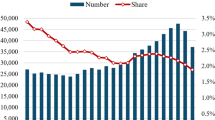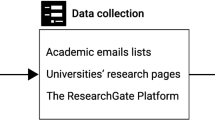Abstract
The increasing importance of the competition in global university ranking has resulted in a paradigm shift in academic governance in East Asia. Many governments have introduced different strategies for benchmarking their leading universities to facilitate global competitiveness and international visibility. A major trend in the changing university governance is the emergence of a regulatory evaluation scheme for faculty research productivity, reflected by the striking features of the recent changing academic profile of publication norms and forms that go beyond the territories of nation-states in the East and West. With the expansion of the Taiwanese higher education system in the last two decades, the maintenance of quality to meet the requirements for international competitiveness has become a key concern for policy makers. Since 2005, the Ministry of Education has introduced a series of university governance policies to enhance academic excellence in universities and established a formal university evaluation policy to improve the competitiveness and international visibility of Taiwanese universities. In so doing, the government has legalized a clear link between evaluation results and public funding allocation. Research performance is assessed in terms of the number of articles published in journals indexed by the Science Citation Index (SCI), the Social Science Citation Index (SSCI), and the Arts and Humanities Citation Index and in terms of citation rates and associated factors. Therefore, evaluation has taken on a highly quantitative dimension. Despite the efforts of concerned parties to encourage academic excellence, the abovementioned quantitative evaluation indicators have resulted in bitter complaints from the humanities and social sciences, whose research accomplishments are devalued and ignored by the current quantitative indicators. In this paper, the authors describe the recent petition for collective action initiated by university faculty to protest the privileging of SSCI and SCI publications as critical indicators for academic performance regardless of faculty discipline and specialization. The article concludes its argument with a group petition calling for more diverse and reliable indicators in recognizing the research of different natures and disciplines while creating culturally responsive evaluation criteria for social sciences and humanities in the Taiwanese academe. The article not only sheds light on academic evaluation literature, especially on the uncertain paradox of globalization and market economy, but also proposes alternatives to the evaluation system for humanities and social sciences in higher education.
Similar content being viewed by others
Notes
According to the Washington and Lee Law Review Rankings (http://lawlib.wlu.edu/lj), the SSCI includes only 20 of the top 50 law review journals. The database contains only a limited selection of legal journals and law reviews. Prestigious journals such as the Harvard Journal of Law and Technology and those from Yale University, Columbia University, and UC Berkeley are not yet included in the SSCI.
References
Altbach, P. G. (2004). Globalization and the university: Myths and realities in an unequal world. Tertiary Education and Management, 10, 3–25.
Ackermann, E. G. (2001). Developing comparative bibliometric indicators for evaluating the research performance of four academic nutrition departments, 1992–1996: An exploratory study. Knoxville, TN: University of Tennessee.
Archambault, É., Vignola-Gagné, É., Côté G., Larivire, V., & Gingrasb, Y. (2006). Benchmarking scientific output in the social sciences and humanities: The limits of existing databases. Scientometrics, 68(3), 329–342.
Bauer, K., & Bakkalbasi, N. (2005). An examination of citation counts in a new scholarly communication environment. D-Lib Magazine 11 (September). Retrieved from http://www.dlib.org/dlib/september05/bauer/09bauer.html.
Chang, K. W., & Ho, M. S. (2007). Half-hearted neoliberal reform: Analyzing Taiwan’s college tuition policy and controversy. Education and Social Studies, 12, 73–112.
Chang, D. F., Wu, C. T. & Ching, G. S. (2009). An evaluation of the dynamics of the plan to develop first-class universities and top-level research centers in Taiwan. Asia Pacific Education Review, 10(1), 47–57.
Chen, K. S., & Qian, Y. X. (2004). Academic production under the neo-liberalism globalization (in Chinese). Paper presented at the reflecting on Taiwan’s higher education academic evaluation conference. International Plenary Hall, National Library, Taipei, Taiwan.
Chou, C. P. (2008). The impact of neo-liberalism on Taiwanese higher education. The Worldwide Transformation of Higher Education International Perspectives on Education and Society, 9, 297–312.
Chou, C. P., & Ching, G. S. (2012). Taiwan education at the crossroad: When globalization meets localization. New York: Palgrave Mcmillan.
Cruz, I. (2007). Challenging ISI Thomson scientifics’ journal citation reports: Deconstructing “objective,” “impact,” and “global.” Vancouver, Canada: PKP Scholarly Publishing. Retrieved from http://scholarlypublishing.blogspot.com.
Dale, R. (2001). Constructing a long spoon for comparative education: Charting the career of the New Zealand model. Comparative Education, 37(4), 493–501.
Dutta, S., & Mia, I. (2010). Global information technology report 2009–2010. Geneva: World Economic Forum and INSEAD.
Garfield, E. (1972). Citation analysis as a tool in journal evaluation: Journals can be ranked by frequency and impact of citations for science policy studies. Science, 178(4060), 471–479.
Garfield, E. (1994a). The concept of citation indexing: A unique and innovative tool for navigating the research literature. New York: Thomson Reuter. Retrieved from http://scientific.thomson.com.
Garfield, E. (1994b). Linking literatures: An intriguing use of the citation index. New York: Thomson Reuter. Retrieved from http://scientific.thomson.com.
Gingrasb, (2006). Benchmarking scientific output in the social sciences and humanities: The limits of existing databases. Scientometrics, 68(3), 329–342.
Giroux, H. A. (2002). Neo-liberalism, corporate culture, and the promise of higher education: The university as a democratic public sphere. Harvard Educational Review, 72(4), 425–463.
Hou, Y. C. (2012). Impact of excellence programs on Taiwan higher education in terms of quality assurance and academic excellence, examining the conflicting role of Taiwan’s accrediting agencies. Asia Pacific Education Review, 13(1), 77–88.
Huang, H. M. (2004). SSCI, TSSCI and Taiwan social science evaluation system (In Chinese). Paper presented at the reflecting on Taiwan’s higher education academic evaluation conference, International Plenary Hall, National Library, Taipei, Taiwan.
Hwang, K. K. (2012). Foundations of Chinese psychology: Confucian social relations. NY: Springer SBM.
IREG. (2010). The Academic rankings: From popularity to reliability and relevance. Retrieved from http://www.ireg-observatory.org/pdf/abstracts_and_speakers.pdf.
Kokko, H., & Sutherland, W. J. (1999). What do impact factors tell us? Trends in Ecology & Evolution, 14(10), 382–384.
Lai, D. M. (2004). Quantitative indexes are not the panacea of academic evaluation (In Chinese). Paper presented at the reflecting on Taiwan’s higher education academic evaluation conference, International Plenary Hall, National Library, Taipei, Taiwan.
Lawani, S. M., & Bayer, A. E. (1983). Validity of citation criteria for assessing the influence of scientific publications: New evidence with peer assessment. Journal of the American society for information science, 34(1), 59–66.
MOE. (2011). Summary of education at all levels in SY 2011. Retrieved from http://english.moe.gov.tw/public/Attachment/271115114171.doc.
Mok, K. H. (2000). Reflecting globalization effects on local policy: Higher education reform in Taiwan. Journal of Education Policy, 15(6), 637–660.
Mok, K. H. (2003). Globalization and higher education restructuring in Hong Kong, Taiwan and Mainland China. Higher Education Research & Development, 22(2), 117–129.
Mok, K. H., & Tan, J. (2004). Globalization and marketization in education: A comparative analysis of Hong Kong and Singapore. Cheltenham, UK: Edward Elgar Publishers. Retrieved from http://www.ireg-observatory.org/pdf/abstracts_and_speakers.pdf.
Paasi, A. (2005). Globalization, academic capitalism, and the uneven geographies of international journal publishing spaces. Environment and Planning A, 37(5), 769–789.
Palmquist, R. A. (2001). Bibliometrics. Austin, TX: University of Texas Austin. Retrieved from http://www.gslis.utexas.edu.
SCImago. (2007). SJR-SCImago journal and country rank. New York: Elsevier.
Shin, J. C. & Harman, G. (2009). New challenges for higher education: Global and Asia-Pacific perspectives. Asia Pacific Education Review, 10(1), 1–13.
Snow, C. P. (1959). The rede lecture. Retrieved from http://s-f-walker.org.uk.
Thomson, R. (2008). Web of science. New York: Thomson Reuter. Retrieved from http://scientific.thomson.com/products/wos/.
Thomson, R. (2010). ISI web of knowledge. New York: Thomson Reuter. Retrieved from http://www.isiwebofknowledge.com/.
Williams, R., & Dyke, N. V. (2004). The international standing of Australian Universities. Melbourne, Australia: University of Melbourne. Retrieved from http://www.melbourneinstitute.com.
Yang, S. K. (2001). Dilemmas of education reform in Taiwan: Internationalization or localization? Paper presented at the 2001 annual meeting of the comparative and international education society, March 13–17, 2001, Washington DC, USA.
Ye, Q. Z. (2004). The lack of the sense of social practice: The myth of criterion-based evaluation (In Chinese). Paper presented at the reflecting on Taiwan’s higher education academic evaluation conference, International Plenary Hall, National Library, Taipei, Taiwan.
Yu, C. L. (2010). A statement on SSCI. Taipei: National Cheng Chi University, forum of public administration.
Acknowledgments
We would like to acknowledge the assistance of Prof. Tsung Chi and Ms. Pei-lun Lee in translation.
Author information
Authors and Affiliations
Corresponding author
Additional information
In December 2010, a group of academics invited both national and international scholars and students in Taiwan to sign a collectively formulated proposal entitled “STOP Using the Social Science Citation Index as the Best Indicator for Academic Research and Related Public Policy.” The proposal received 2,247 supporters by April 2012. Two months later, the new minister of education and the new minister of the National Science Council recognized the SSCI issue and changed the “Evaluation Indicator First” policy. The following paper is a demonstration of how SSCI and SCI have affected the academia of Taiwan in its pursuit of world-class universities and the internationalization of higher education at the expense of social equity and cultural heritage.
Rights and permissions
About this article
Cite this article
Chou, C.P., Lin, H.F. & Chiu, Yj. The impact of SSCI and SCI on Taiwan’s academy: an outcry for fair play. Asia Pacific Educ. Rev. 14, 23–31 (2013). https://doi.org/10.1007/s12564-013-9245-1
Published:
Issue Date:
DOI: https://doi.org/10.1007/s12564-013-9245-1




